
Elkin Garavito (left) is manager of the Hacks/Hackers project, whose participants include journalists, cartographers, designers, developers, Web entrepreneurs and environmentalists. (Photo by Ronnie Lovler)
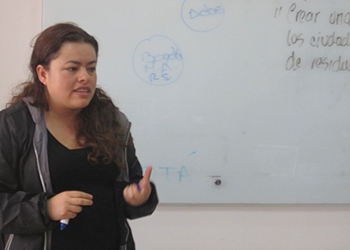
Among those working on strategy, which includes focusing first on monitoring waste management concerns in the capital city, is Rayza Reyes Marciales, who is building a journalism website.
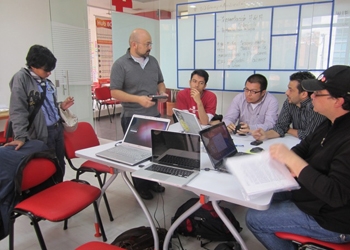
Information management specialist Luis Hernando Aguilar, standing, is part of the technology team on the project, which uses the open-source Ushahidi mapping platform. (Photo by Elkin Garavito)
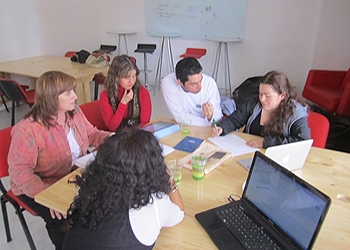
The group worked on strategies for citizen input monitoring the garbage problems of Bogota, a city of more than 8 million people.
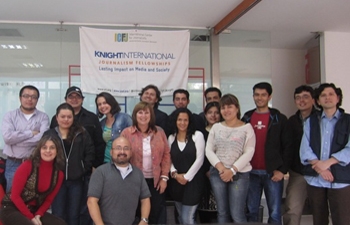
Colombia’s first Hacks/Hackers group met August 11 in Bogota.
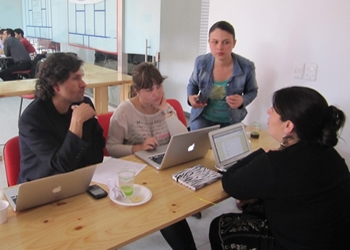
The communications team on the project will vet citizen reports and write website content. (Photo by Ronnie Lovler)
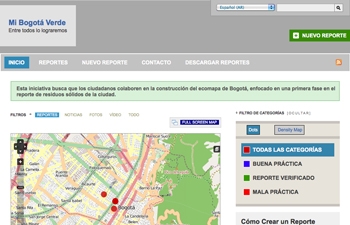
A look at the digital map in progress.
“Mi Bogotá Verde,” or My Green Bogota, a new, crowdsourced digital map that will track solid waste disposal – the first of many urban environmental concerns – is just weeks away from going online in Bogota.
The map was developed during the first hackathon of the Bogota chapter of Hacks/Hackers, created just four months ago.
I am co-organizer of this chapter, the first in Colombia, something I spearheaded as part of my mandate as a Knight International Journalism Fellow here.
Hacks/Hackers is an international organization of journalists (hacks) and computer technologists (hackers) with more than 10,000 members worldwide. The Bogota chapter is nearing the 200-member mark.
This is third mapping project I have coordinated during my one-year stay here. In July, we at ICFJ launched a digital map to track political and administrative corruption in Colombia in partnership with the Consejo de Redacción, an organization of investigative journalists. We also partnered with El Tiempo, Colombia’s largest newspaper, to develop a digital map to monitor crime in the capital, a map that is to go live this month.
Our hackathon on August 11 was organized with the idea of putting together a general environmental map, but we decided rather than trying to deal with all environmental concerns, we would kick off by focusing on just one.
Our digital map will seek citizen input to monitor the garbage problem in this capital city of more than 8 million people.
What is going to make this map stand out is our thumbs-up, thumbs-down approach to the solid-waste problem. Rather than treating this as a crisis map, we will also show where and when something is done right.
We are kicking off with just three main categories – good and bad practices for dealing with solid waste, and reports verified by editors. With time, the map will expand to include other urban environmental concerns. We are using the open-source Ushahidi mapping platform.
The slogan for the map, “Entre todos lo lograremos,” or “All together, we will succeed,” also applies to the 20-plus people who showed up for the hackathon.
Our participants included journalists, cartographers, designers, developers, Web entrepreneurs and environmentalists.
We think it’s a terrific start for one of the newest Hacks/Hackers chapters.
The mapping project was selected at the second Hacks/Hackers Bogota meeting in late May. A volunteer organizing committee met periodically in June and July to get things going and keep up the momentum.
And when we all got together, the momentum was definitely there, first through our brainstorming and then with our get-down-to-it attitude to move ahead. We divided into three groups to get our work done – communications, strategy and technology.
“I love the topic,” said Diana Salazar, who works in strategic digital communications at the Bogota Mayor’s Office. “And I think this interdisciplinary approach is important to generate optimum results.”
We had lots of help. HubBOG, which fosters shared workspaces and entrepreneurship, opened up one of its workspaces. There was participant spillover from the members and organizers of Bogodev, a meetup group of Web and mobile developers, and Bogotech, an organization of entrepreneurs and technology enthusiasts. Co-organizer Renata Cabrales, social media editor at El Tiempo, got us some great pre-hackathon coverage.
Now the work is continuing through the Google group we set up at the hackathon. You can follow us on Twitter at #BogmapaAmbiental.